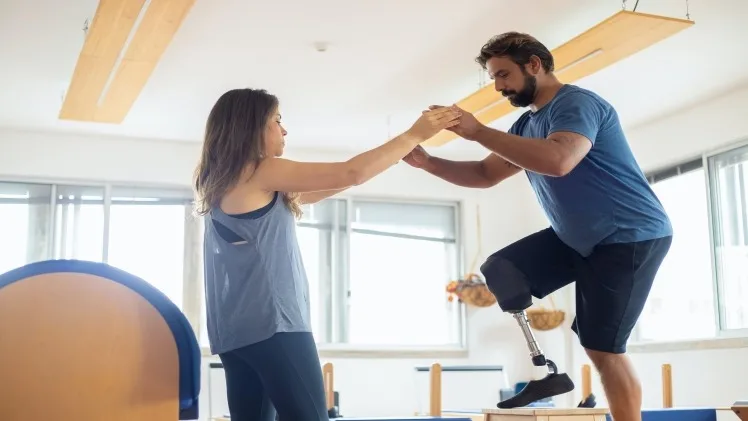Introduction
We all aspire to live whole and meaningful lives. Yet, for people with disabilities, achieving this objective can be pretty challenging. Here is where the services of an NDIS physiotherapist come into the picture, providing the necessary support and guidance for these individuals to achieve their aspirations and increase their independence. This article explores how NDIS physiotherapists transform lives by unlocking the inherent potential within every individual.
Understanding NDIS Physiotherapy
What is NDIS?
The National Disability Insurance Scheme (NDIS) is a significant social reform in Australia that supports people with disabilities, their families, and carers. It’s a new way of offering individualised support for people with permanent and significant disabilities, helping them build skills and capabilities to participate in the community and the workforce.
What is NDIS Physiotherapy?
Physiotherapy under the NDIS aims to improve participants’ functional ability, helping them achieve their goals, participate in daily activities, and enhance their overall well-being. By addressing physical challenges, NDIS physiotherapy enables individuals to lead more independent and fulfilling lives.
The Role of an NDIS Physiotherapist
Assessing Individual Needs
A crucial first step in physiotherapy is the comprehensive assessment of an individual’s physical capabilities, limitations, and goals. The NDIS physiotherapist uses a combination of tests, observations, and interviews to gauge the participant’s needs accurately.
Creating Personalized Plans
Once the assessment is completed, the physiotherapist creates a personalised plan that aligns with the individual’s NDIS goals. This plan encompasses a wide array of exercises, interventions, and treatments that are designed to address the person’s unique needs.
Implementing and Adjusting the Plan
The next step is implementing the plan, where the NDIS physiotherapist guides the participant through the prescribed exercises and interventions. As progress is made, the physiotherapist continually assesses and adjusts the project to ensure optimal results.
Transforming Lives: The Impact of NDIS Physiotherapy
Enhanced Mobility
One of the most obvious ways an NDIS physiotherapist transforms lives is by improving mobility. From strengthening muscles to increasing joint flexibility, the exercises and treatments can significantly enhance a person’s ability to move independently.
Increased Independence
The journey towards independence often begins with the simple yet empowering ability to move freely. The focus of NDIS physiotherapy, therefore, goes beyond merely improving mobility. A significant component is enabling individuals to regain the independence they once had or attain the level of independence they aspire to achieve
The process of increasing independence via NDIS physiotherapy is multi-faceted. It begins with carefully designed physiotherapy programs that address the specific mobility challenges each faces. Whether it’s about strengthening weak muscles, improving coordination, or enhancing balance, each step contributes to the individual’s capacity to perform daily tasks independently.
Physiotherapy sessions often incorporate real-world scenarios and daily tasks into the therapy plan, such as climbing stairs, reaching for items on a high shelf, or walking on uneven surfaces. By integrating these activities, individuals learn to transfer the skills acquired during therapy sessions to their day-to-day lives.
Improved Quality of Life
Ultimately, the increased mobility and independence contribute to an improved quality of life. Participants often report better mental well-being, higher self-esteem, and more extraordinary accomplishment and fulfillment.
NDIS physiotherapists play a critical role in transforming the lives of people with disabilities. They assess the individuals’ physical capabilities, devise personalised plans, and provide targeted interventions, helping them improve their mobility, regain their independence, and enhance their quality of life. The transformative power of NDIS physiotherapists lies in their ability to unlock the inherent potential within every individual, enabling them to live fulfilling lives despite their physical limitations. As we continue to build inclusive societies, the work of these professionals becomes increasingly critical, proving that disability does not mean inability.
The Expanding Reach of NDIS Physiotherapy
As NDIS physiotherapy continues to make a significant difference in people’s lives, there’s an ongoing effort to expand its reach and enhance its effectiveness.
Embracing Technology
NDIS physiotherapists are increasingly using technology to enhance their services. For example, digital platforms facilitate virtual consultations, allowing individuals in remote areas to receive physiotherapy services. Assistive technologies like virtual reality and robotic devices can offer immersive, high-intensity therapy sessions that are both effective and engaging.
Collaborative Approach
A collaborative approach involving other healthcare professionals, such as occupational therapists, psychologists, and speech therapists, is becoming more common in NDIS physiotherapy. By working together, these professionals can provide a comprehensive, holistic approach to care, addressing all aspects of an individual’s well-being.
Empowering Participants
Another critical development in NDIS physiotherapy is the shift towards empowering participants to take control of their therapy. Physiotherapists teach individuals and their families to conduct exercises and interventions at home, promoting ownership and continuous progress.
The Future of NDIS Physiotherapy
The future of NDIS physiotherapy looks promising, with advancements in research and technology promising to bring even more transformative results.
Innovative Treatments
As our understanding of disabilities and their management continues to grow, we can expect to see the introduction of innovative treatments that can better target the specific needs of individuals. From advanced therapeutic techniques to cutting-edge assistive devices, the field of NDIS physiotherapy is set to evolve substantially.
Improved Accessibility
Efforts are being made to improve the accessibility of NDIS physiotherapy services. With advancements in technology and changes in policy, it is hoped that more individuals, regardless of their location or socio-economic status, can access these life-transforming services.
More Comprehensive Care
The trend towards a more holistic, interdisciplinary care approach will likely continue. By integrating physiotherapy with other health services, NDIS participants can expect a more comprehensive care plan that addresses their physical, emotional, and mental well-being.
Conclusion
NDIS physiotherapy has proven to be an essential service for people with disabilities, unlocking their potential and transforming their lives. With its evolving nature and expanding reach, NDIS physiotherapy is set to continue significantly impacting individuals’ lives, enabling them to live with greater independence, mobility, and fulfillment. In a society that values inclusivity, the work of NDIS physiotherapist holds immense value, embodying the belief that everyone deserves the chance to lead a fulfilling life, regardless of their physical limitations.


